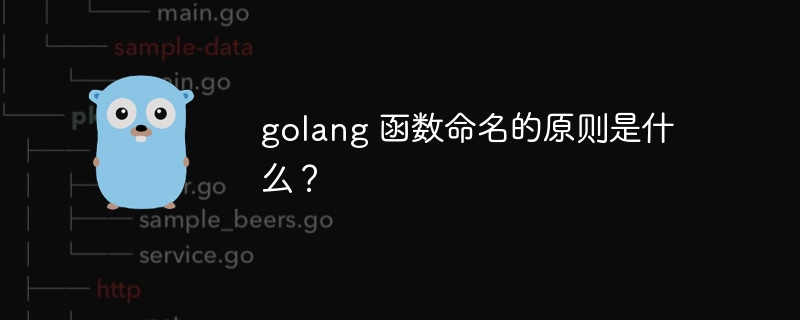
There are four principles for naming Go functions: Use camel case naming starting with lowercase to keep it short and descriptive. Follow naming conventions and consider readability.

Go function naming Principle
Principle 1: Use camel case nomenclature starting with lowercase
Go function names should use camelCase nomenclature starting with lowercase, for example:
func getUserName() string { /* ... */ }
Principle 2: Keep it short and descriptive
Function names should be short and descriptive so that their meaning is clear at a glance. Avoid using names that are too vague or broad.
// 不佳 func processData(data interface{}) { /* ... */ } // 较好 func calculateSaldo(transactionData []Transaction) float64 { /* ... */ }
Principle 3: Follow naming conventions
For specific types of functions, established naming conventions should be followed. For example:
GetThe prefix indicates the get methodSetThe prefix indicates the set methodValidateSuffix indicates verification methodPrinciple 4: Consider readability
Function names should be easy to read and understand. Avoid using abbreviations or obscure terms.
// 不佳 func gUSN() string { /* ... */ } // 较好 func GetUniqueSerialNumber() string { /* ... */ }
Practical Case
type User struct { Name string Age int } // 获取用户的姓名 func getUserName(u User) string { return u.Name } // 计算用户的年龄 func calculateUserAge(u User) int { return u.Age }
Following these principles can improve the code readability, maintainability and understandability of Go functions.
The above is the detailed content of What are the principles for naming functions in golang?. For more information, please follow other related articles on the PHP Chinese website!
 How to define variables in golang
How to define variables in golang What are the data conversion methods in golang?
What are the data conversion methods in golang? What are the commonly used libraries in golang?
What are the commonly used libraries in golang? What is the difference between golang and python
What is the difference between golang and python What programming language is c language?
What programming language is c language? The difference between injective and surjective
The difference between injective and surjective What to do if there is no sound from the computer microphone
What to do if there is no sound from the computer microphone How to restore Bluetooth headset to binaural mode
How to restore Bluetooth headset to binaural mode



